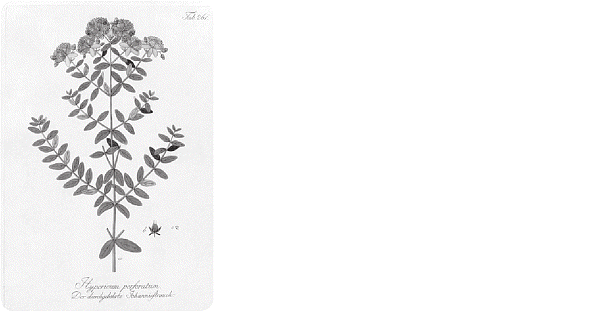WEDNESDAY, DAY 3
DRUGS AND ALTERNATIVE TREATMENTS
St. John’s Wort
An ancient remedy for depression, anxiety, and other mental disorders, Hypericum perforatum, a plant commonly known as St. John’s wort, is still sometimes used as a supplement today. It should be taken cautiously, however, as it can interact with many medications.

Medicinal applications for St. John’s wort were first recorded in ancient Greece, when its yellow flowers were used to prepare teas and tablets containing concentrated extracts. It has been used to treat wounds, burns, insect bites, and malaria, among other ailments.
There is conflicting evidence about the herb’s effectiveness against depression. Two large studies found that it was ineffective, while other evidence suggests it has a modest effect on mild cases.
Generally, St. John’s wort is well tolerated in recommended doses for up to 3 months. However, because it affects the way the liver’s cytochrome P450 enzyme system processes many drugs, the herb can speed up or slow down the breakdown of certain medications, including antidepressants, birth control pills, blood thinners, and drugs used to treat cancer or HIV infection. This can keep medications from working properly or may increase the severity of side effects such as high blood pressure, suicidal thoughts, or serotonin syndrome—a potentially fatal condition associated with the antidepressant MAO inhibitors, selective serotonin reuptake inhibitors, and serotonin-norepinephrine reuptake inhibitors. St. John’s wort can also cause anxiety, dry mouth, gastrointestinal symptoms, fatigue, headache, decreased sexual function, and increased sensitivity to sunlight.
Early studies of Hypericum cream in the topical treatment of mild to moderate dermatitis (dry, irritated skin) have shown positive results. St. John’s wort may also help calm nerve pain, premenstrual syndrome, and seasonal affective disorder, although more research is needed.
ADDITIONAL FACTS
- The flower of St. John’s wort blooms in late June, close to the feast day of St. John the Baptist on June 24—hence the first part of the plant’s name. Wort is an archaic term for medicinal plants.
- St. John’s wort is also known as amber touch-and-heal, balm-of-warrior’s-wound, balsana, devil’s scourge, and witcher’s herb.
- The flowers and stems of St John’s wort have been used to produce red and yellow dyes.